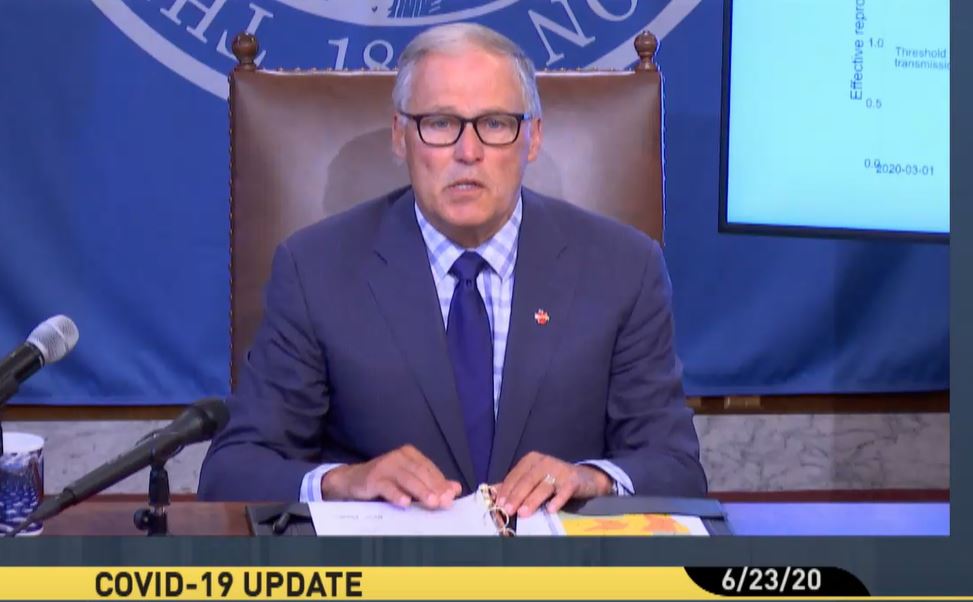
Governor Jay Inslee Issues Statewide Mask Requirement; Yakima Hospital Clarifies Capacity Question
READ ON
BY AUSTIN JENKINS & ENRIQUE PÉREZ DE LA ROSA
After weeks of relying on voluntary compliance, Washington Gov. Jay Inslee on Tuesday afternoon announced an enforceable, statewide requirement that people wear face coverings when in public, including outdoors when six feet of separation can’t be maintained. The new public health order, to be issued by the Secretary of Health, takes effect on Friday.
“This means when you’re in a public place,” Inslee said during a news conference. He added that wearing a mask is a way of showing care for others. “I think this is something we can get used to.”
The statewide mandate comes as counties are reopening and summer kicks off amid an uptick in new COVID-19 cases in Washington, which so far has reported nearly 30,000 confirmed cases and more than 1,200 deaths.
ALSO SEE: Yes, Wearing Facial Coverings Works. Here’s Why
WHO APPLIES, WHO’S EXEMPT
The new statewide requirement applies to all residents six years old and up. Children under age two are exempt. For kids age three to five, masks are strongly encouraged. There are also exemptions for people who are hard of hearing or deaf, specifically when they are actively communicating with others.
Since April, the Centers for Disease Control and Prevention has recommended facial coverings as a way to reduce the spread of COVID-19. One concern is that many people who have the virus are asymptomatic and may not know they’re contagious. It’s believed the virus is most easily transmitted through microscopic, aerosolized droplets expelled when a person breathes, sneezes or coughs.
A person who violates the Department of Health’s order could be cited with a misdemeanor. However, the governor’s office also acknowledged that at times it would be impractical to wear a mask, like while eating at a restaurant or when recreating outdoors alone or with family members. Under those circumstances, a person could remove their mask so long as they’re distanced from other groups.
The statewide requirement comes on the heels of Inslee’s order on Saturday that masks would be required in hard hit Yakima County, which is now approaching the same number of COVID-19 cases as the entire state of Oregon. Previously, Inslee required the use of masks in workplaces.
To date, Yakima County – with approximately 250,000 residents – has reported more than 6,000 cases – about 22 percent of the state’s total cases – and 138 deaths.
“As Yakima County goes so goes the rest of the state,” Inslee said in his Saturday news conference.
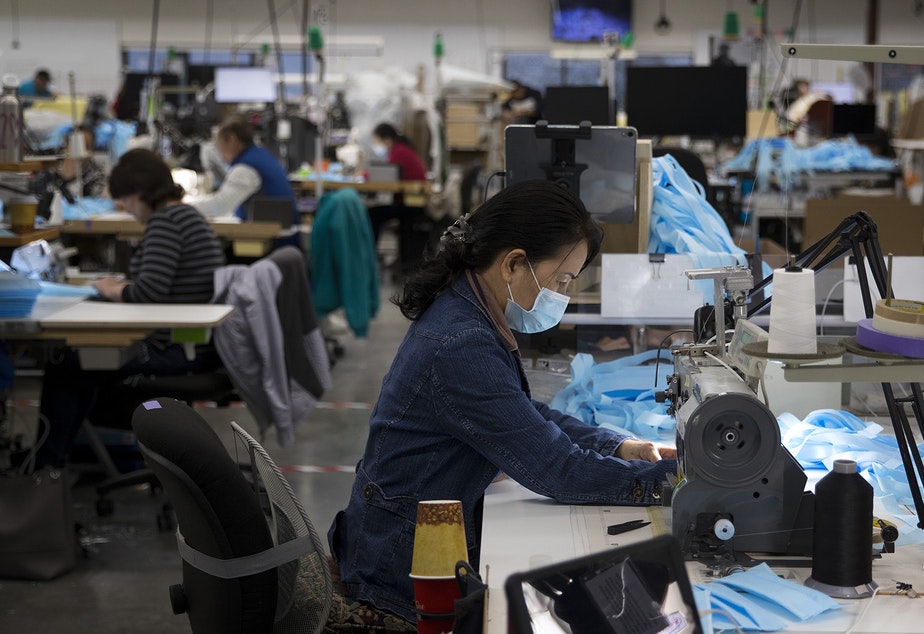
Kaas Tailored employees sew masks on March 23, 2020, at the Kaas Tailored furniture factory in Mukilteo, Washington.
CREDIT: Megan Farmer/KUOW
On Tuesday, Inslee also announced additional, tougher requirements in Yakima County that prohibit a person from entering a business – including businesses that operate outdoors – without a mask. The order also prohibits businesses from allowing customers onto their premises without a mask.
In May, San Juan County became the first and only county to impose a county-wide facial covering requirement enforceable by law. Several other counties have issued directives to use masks.
“Overall, compliance has been great,” said Brendan Cowan who directs San Juan County’s Department of Emergency Management.
Inslee announced the new mask mandate at a virtual news conference that included Costco President and CEO Craig Jelinek and Faye Guenther, the president of the United Food and Commercial Workers Local 21 union.
Along with healthcare workers, grocery store employees have been highlighted as essential employees who are at especially high risk from the virus because of their close contact with customers.
Joining Other States
In issuing a statewide mask requirement, Washington joins California and 14 others states and the District of Columbia, according to tracking by CNN. Last week, Oregon Governor Kate Brown ordered face masks be used in indoor public spaces in seven Oregon counties.
ALSO SEE: Yes, Wearing Facial Coverings Works. Here’s Why
In recent weeks, the Washington Department of Health has been authorizing individual counties to proceed through a four phase reopening process. As of Tuesday, 15 mostly smaller counties are in phase three, 19 are in phase two and five remain in phase one.
During this sequential unlocking of the economy, Inslee has become an avowed evangelist for mask use – so much so that he now has a ritual of unmasking just before he begins his news conferences. Asked recently about the state’s COVID-19 testing capacity, which the governor has also made a top priority, he quickly pivoted back to masks.
“I have to tell you that this is not my greatest concern right now,” Inslee said in response to the testing question. “My greatest concern is the lack of masks because that is the single thing that everyone can do.”
According to the state’s COVID-19 dashboard, Washington is not meeting three of the governor’s top five metrics for containment, including fewer than 25 new cases per 100,000 people during the prior two weeks and more than 50 people tested for each new case identified during the prior week.
Currently, the state is seeing nearly 59 new cases per 100,000 people in a two week period and testing just 27 individuals for each new positive case.
Yakima Hospital Situation
Last week, the Yakima Health District announced the local critical care hospital had run out of bed capacity due to the pandemic. But there’s more to it than that.
Leaders of Virginia Mason Memorial said Tuesday that, in fact, they do have beds, about 80 were available June 23. The real issue is staffing for the hospital’s 27 critical care beds. Hospital CEO Carole Peet said in a Tuesday press briefing that caring for COVID-19 patients is a lot more labor-intensive.
“So we have more than one nurse assigned to the COVID patients. They work in teams. The critical care physicians work in teams,” Peet said. “So it really limits our ability to take care of a certain number of people at a time in order to make sure we’re providing that highest quality of patient care.”
According to Peet, it’s hard to find enough specialized critical care physicians and nurses in Yakima. The staffing shortage has forced Virginia Mason to transfer more patients to western Washington hospitals, averaging about three transfers per day. Transfers peaked at 17 on June 18. That could worsen if hospitalizations continue to rise.
Tanny Davenport is physician executive for Virginia Mason Memorial. He said Tuesday that the governor’s masking mandate is necessary to prevent hospitalizations from rising.
“We know that by the time you get to the hospital with COVID-19 we can’t reverse it,” Davenport said. “And you are going to be set with a hospitalization that is going to be longer, potentially be on a ventilator, hopefully, get off that ventilator, and that’s a huge strain on the system. The only way we can prevent these hospitalizations is to prevent the spread of disease. Masking is incredibly important.”
Hospital officials say the facility could still be overwhelmed if hospitalizations for COVID-19 continue to climb. But mask use is also on the rise, according to a new survey conducted by the Yakima Health District. 65% of Yakima residents are wearing face coverings, up from 35% a month ago.
Austin Jenkins is Olympia correspondent for the public media Northwest News Network. Enrique Pérez de la Rosa covers the Yakima Valley and central Washington for Northwest Public Broadcasting.
Related Stories:
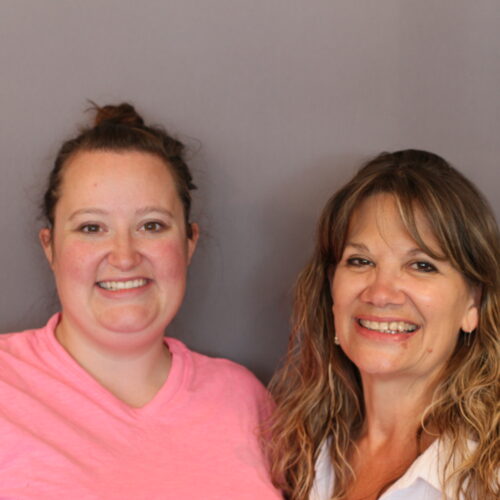
StoryCorps Northwest – Cindi Rang & Brianna Motzkus: making masks for the pandemic
Brianna Motzkus, left, and her mother Cindi Rang at their StoryCorps Northwest recording. Listen (Runtime 4:26) Read The early pandemic was chaos. Masks and other PPE were scarce. Cindi Rang
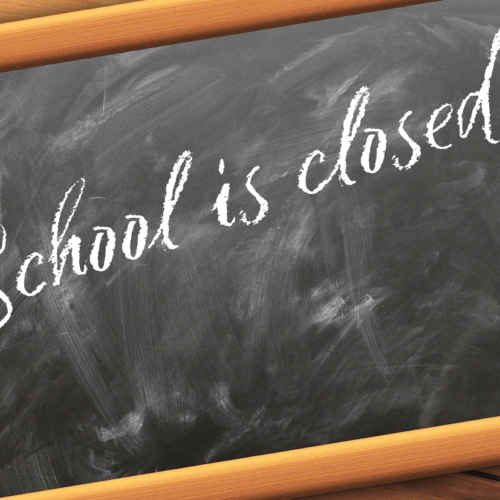
Richland students will return to classes after mask flap
Read The Richland School Board Thursday evening voted to allow children to go back in-person and to follow the Governor’s Mask Mandate on a vote of 4 to 1. This
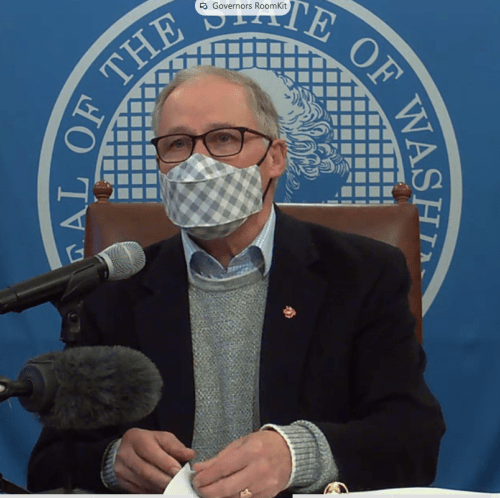
As Omicron Soars, Inslee Announces Expanded Testing And Mask Distribution To Keep Schools Open
Washington Gov. Jay Inslee says the state is racing to expand access to testing, masks and vaccines, but has no immediate plans to impose new rollbacks, mandates or restrictions in the face of an unprecedented wave of new COVID-19 cases driven by the omicron variant.















